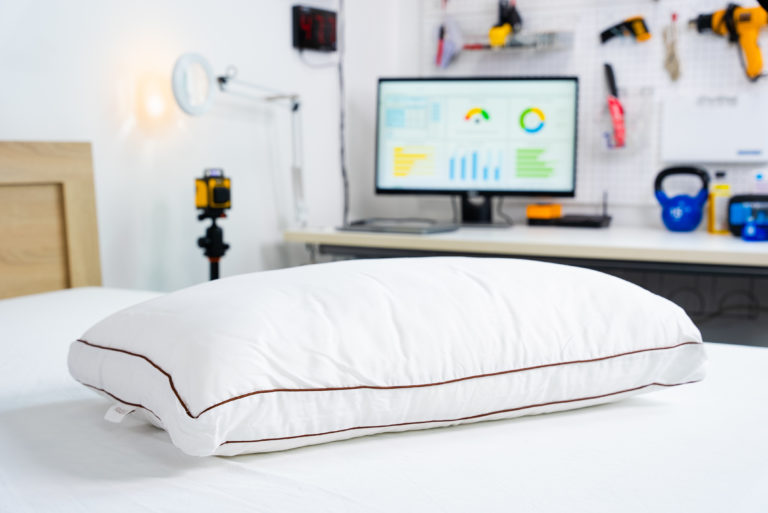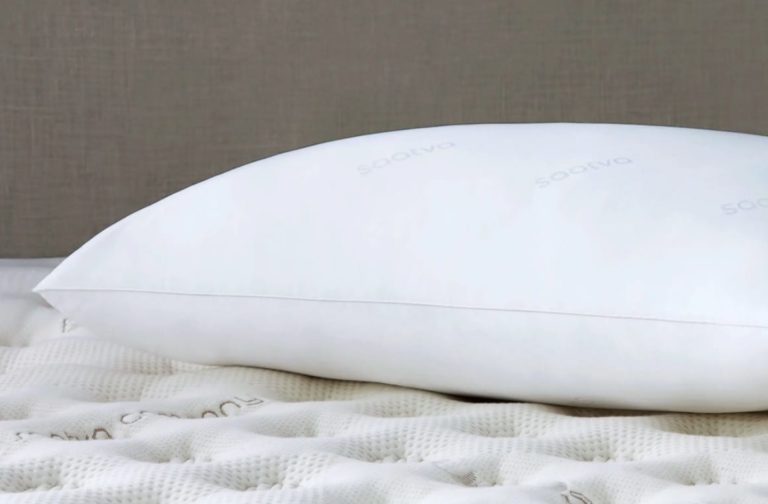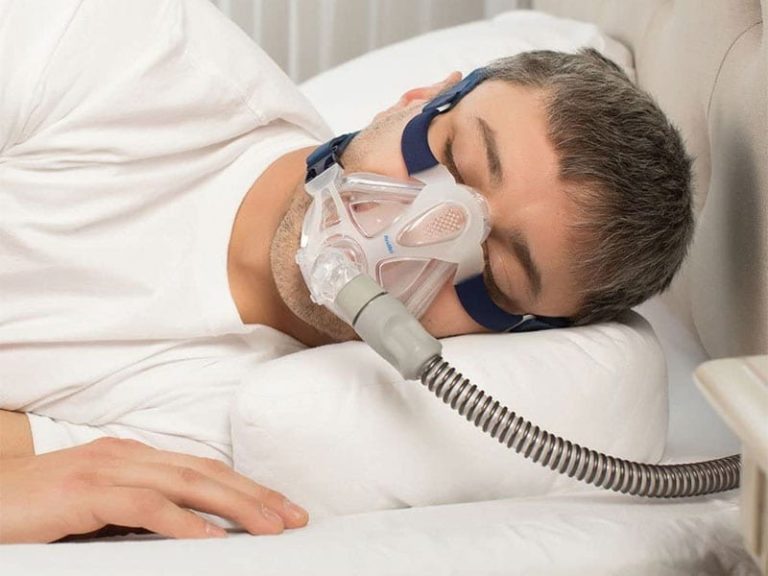When you buy through our links, we may earn a commission. Products or services may be offered by an affiliated entity. Learn more.
While there’s no reliable cure for snoring, some adjustments may help reduce it. Purchasing a pillow for snoring is often one of the first attempts sleepers make to find relief since this option is usually affordable and convenient.
For many individuals, snoring is affected by your sleeping position. A pillow that sufficiently lifts the upper body may help reduce airway compression from the head falling back due to an unsupportive pillow or being pushed too far forward by a pillow that’s excessively thick and/or firm.
Below, we’ll share some of the best pillows for snoring and explain how they may help. We’ll also examine factors that could influence which pillow may be best for your snoring, explore possible causes of the condition, and provide other potential ways to reduce snoring.
The Best Pillows for Snoring
- Best Overall – Saatva Latex Pillow
View Details
- Best Value – Brooklyn Bedding Talalay Latex Pillow
View Details
- Most Comfortable – Silk & Snow Pillow
View Details
- Best Wedge Pillow – Helix Wedge Pillow
View Details
- Best for Back Pain – DaVinci Orthopedic Pillow
View Details
- Best Neck Support – Bear Pillow
View Details
- Best Pressure Relief – Sweet Zzz Plant-Based Pillow
View Details
- Best Adjustable Loft – Layla Kapok Pillow
View Details
Swipe for more
Best Overall
Saatva Latex Pillow
9.6 /10
Test Lab Score
Use this link for the most current discount.
Use this link for the most current discount.
The Saatva Latex Pillow features a supportive core and plush fiber fill in the outer chamber, creating a soft surface for your head and neck without too much sink when weight is applied. You can separate the inner and outer pillows and use them separately if you find a lower profile more comfortable, or combine them for a high-loft design ideal for side sleeping.
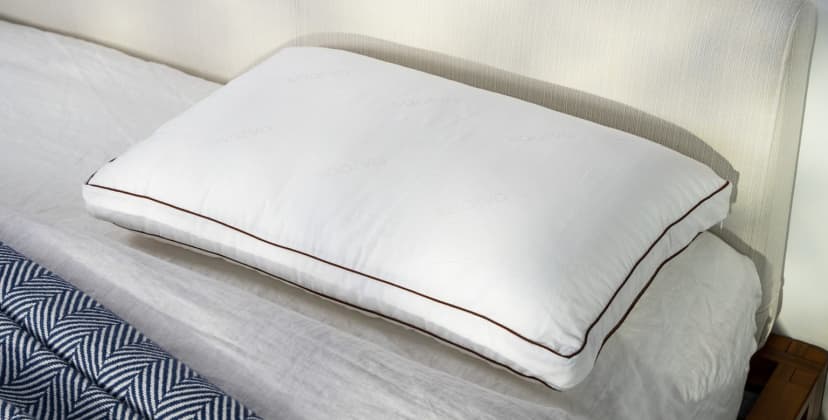


Credit: Sleep Foundation Test Lab
Price Range
$165 – $185
Fill
Shredded Talalay latex and down alternative
Firmness
Medium Soft
Full Details
Thanks to its three-part design, the Saatva Latex Pillow gives back sleepers the power to add or remove components to achieve the best loft for their snoring.
The core consists of shredded Talalay latex that combines support, shape retention, responsiveness, and breathability to help keep the spine aligned without retaining a lot of heat. This piece fits into an outer plush layer of down-like microdenier fiber encased in a cotton shell, which adds cushioning and loft while enhancing the breathability. A cotton pillow cover zips over these layers.
Both the microdenier fiber layer and cover are removable and machine-washable. Owners can configure their pillow however they like, whether that involves combining all three pieces or using the Talalay core and microdenier fiber layers separately.
When fully assembled, the pillow has a medium soft feel that may be most comfortable for individuals who weigh less than 130 pounds. Snorers who weigh more than 230 pounds may not get enough support to prevent their head from slumping down and increasing pressure on the airway.
The Saatva Latex Pillow is available in queen and king sizes. It comes with a 45-day return policy, during which customers can return the product for a full refund of the purchase price if they decide it’s not right for them.
Best Value
Brooklyn Bedding Talalay Latex Pillow
9.0 /10
Test Lab Score
25% off sitewide
25% off sitewide
Brooklyn Bedding’s Talalay Latex Pillow is a steal for budget shoppers — the sticker price falls well below average, while the expected lifespan is at least three years. People who snore can really benefit from the thick loft and buoyant latex core, which lifts the head and neck to keep the airway open.
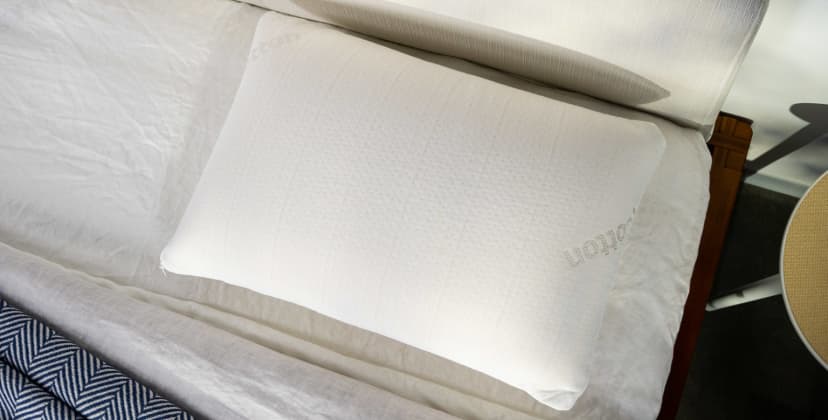

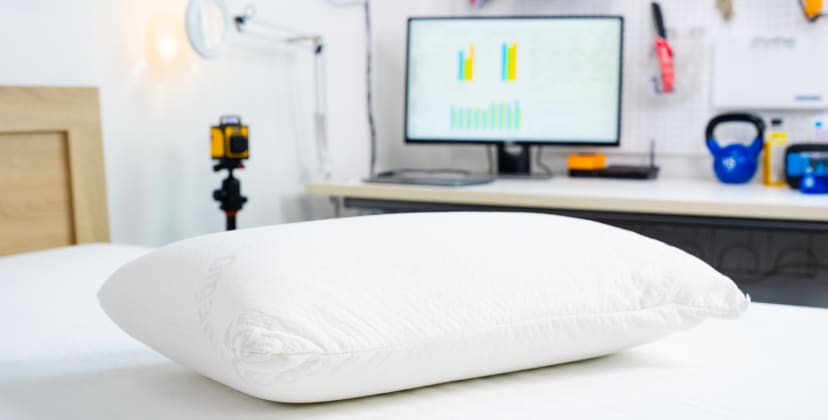
Credit: Sleep Foundation Test Lab
Price Range
$89 – $99
Fill
Talalay latex
Firmness
Medium Firm
Full Details
Many leading pillows for people who snore are on the expensive side, but Brooklyn Bedding bucks this trend with the Talalay Latex Pillow. The core contains a single piece of solid latex, which provides gentle cushioning without the deep hug of memory foam. Latex is also highly buoyant, allowing your head to remain aloft with your airway open while your neck receives proper support.
The latex is ventilated with small holes to promote circulation throughout the pillow’s core. This reduces heat absorption and helps you sleep at a comfortable temperature. Another cooling component is the cover made of Tencel, a eucalyptus-derived fabric known for excellent breathability and moisture wicking. You can remove the cover and machine-wash as needed to keep the pillow clean.
Brooklyn Bedding offers two loft options. During hands-on tests, side sleepers on our team found the thicker 5-inch profile more comfortable. Side sleepers often need extra padding to cushion the area between their head and downward-facing shoulder — this promotes proper alignment and prevents pressure buildup in the neck and shoulders. Our back sleepers preferred the 4-inch pillow, which elevated the head just enough to keep their airway open without causing neck strain. Both pillows were too thick for most of our stomach sleepers, though some didn’t mind the lower-loft design as much.
In addition to its approachable sticker price, the Talalay Latex Pillow qualifies for free ground shipping throughout the contiguous U.S. Each order includes a 30-night sleep trial. If you decide to keep the pillow after the return period ends, Brooklyn Bedding further backs your purchase with a three-year warranty against manufacturing defects.
Best for Side Sleepers
Eli & Elm Cotton Side-Sleeper Pillow
8.9 /10
Test Lab Score
20% off
20% off
The Eli & Elm Cotton Side Sleeper- is ergonomically shaped and packed with cushy, responsive fill. This helpful design ensures proper neck support and comfy elevation for your head, and you can adjust the fill to achieve your ideal loft.
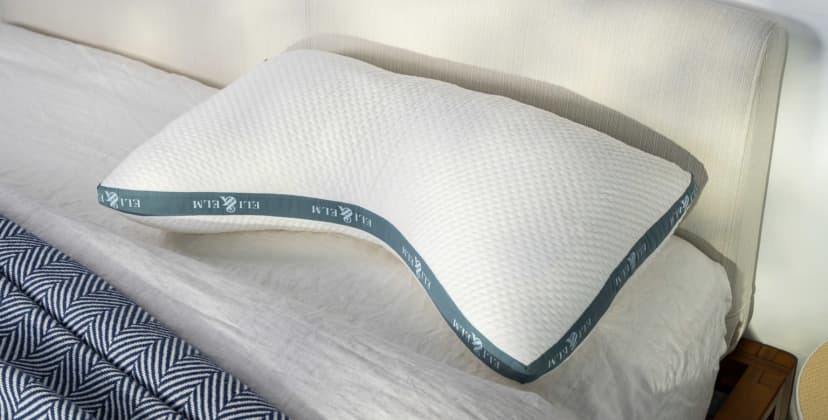


Credit: Sleep Foundation Test Lab
Price Range
$115 – $124
Fill
75% shredded latex or shredded memory foam, 25% polyester fiber
Firmness
Medium, Adjustable
Full Details
The Eli & Elm Cotton Side-Sleeper Pillow’s unique U-shape is specially designed to promote proper spinal alignment for side sleepers, which may also limit airway compression that could cause snoring.
Shredded latex and polyester make up the fill for a plush, supportive, highly moldable surface. The fill is encased in an interior liner, and an outer cover consisting of cotton, polyester, and spandex goes over it. This cover is removable and machine-washable in cold water. Both the fill and cover materials let air circulate to limit heat buildup and help the sleeper maintain a more comfortable temperature.
Owners can customize the firmness of the Side-Sleeper Pillow by unzipping it and adding or removing fill to achieve the desired firmness, support, and loft. Unmodified, the pillow has a medium feel. However, if this is not firm enough, you can request additional fill for a fee. Snorers can test out different fill levels until they find the solution that works best for them.
Customers that are not satisfied with the pillow can return it for the first 45 days for a full refund of the purchase price. A 5-year warranty covers defects in materials and workmanship, including issues like the stitching coming undone and the fabric fraying or ripping.
Most Comfortable
Silk & Snow Pillow
9.0 /10
Test Lab Score
Use this link for the most current discount.
Use this link for the most current discount.
The Silk & Snow Pillow contains shredded memory foam you can add or remove to adjust how thick and firm it feels. People who snore are likely to prefer full volume and high loft — especially if they sleep on their sides.
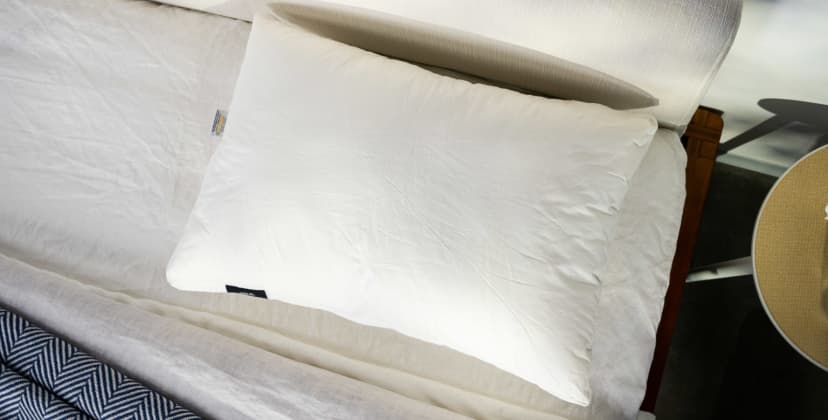
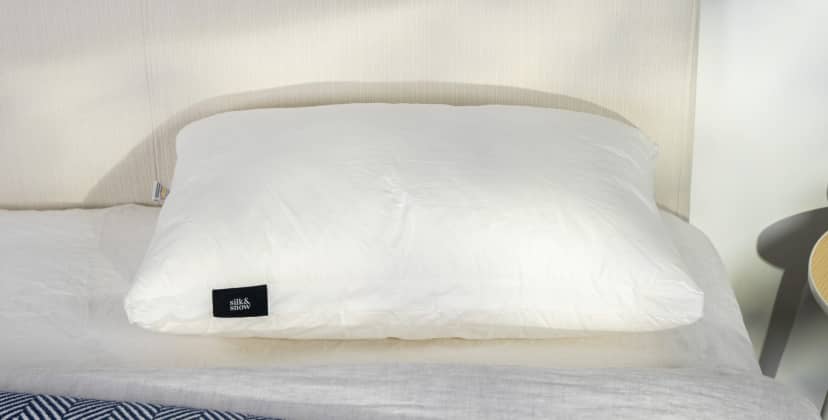
Credit: Sleep Foundation Test Lab
Price Range
$75 – $85
Fill
Shredded memory foam and down alternative fibers
Firmness
Medium
Full Details
The Silk & Snow Pillow has a dual-chamber design that offers plushness without sacrificing support. The result is beneficial for sleepers who frequently wake up with aches or pain in the neck.
The pillow has a medium feel and features a core composed of shredded memory foam, which is known for its adaptive properties. The core is surrounded by an outer layer of down alternative microfiber that creates a fluffy, cradling surface for your head and neck. You may remove or add memory foam as needed to achieve your ideal loft. This adjustable design makes the pillow a strong option for all back and side sleepers, since they can customize the thickness to a height that feels comfortable for their head and neck.
The shell is made of 100% cotton that is machine-washable using a cold-water cycle and low dryer setting. The shredded composition of the foam and breathability of the cotton allow air to flow through the pillow, so hot sleepers who normally overheat on foam pillows should find this model reasonably comfortable.
The pillow comes with a 100-night sleep trial and is also backed by a three-year warranty. Shipping is free to addresses in the contiguous U.S. and all Canadian provinces.
Best Wedge Pillow
Helix Wedge Pillow
8.6 /10
Test Lab Score
Use this link for the most current Helix discounts
Use this link for the most current Helix discounts
If you’re prone to heavy snoring, the Helix Wedge Pillow should provide enough elevation to raise your head and expand your airway. Firm, solid foam provides excellent support and shouldn’t sink too much when weight is applied.

Price
$109
Fill
Gel Memory Foam and Polyfoam
Firmness
Medium Firm
Full Details
The Helix Wedge Pillow lifts the upper body while conforming to the sleeper’s shape to reduce airway compression from gravity without creating sharp pressure points.
This pillow measures 24 inches by 24 inches by 10 inches and uses a classic triangular wedge design. It has a medium firm feel and is constructed of a layer of gel memory foam and a layer of polyfoam to mold to the body without allowing excessive sinkage. A rayon and polyester blend cover allows air to circulate into the pillow so that heat can escape. This cover can be removed and washed in a machine to keep the surface fresh.
Given its firmness, the Helix Wedge Pillow may provide the best mixture of cushioning and support for those who weigh over 130 pounds. The wedge shape is most conducive to back sleeping, though some also enjoy this design for side sleeping.
Shape retention, conforming, and durability are among the Helix Wedge Pillow’s greatest strengths. It should resist indentations and sagging to provide support for years to come, while also contouring enough for added comfort.
A 100-night sleep trial allows you to test whether this pillow helps improve your snoring. If you don’t find relief after 30 nights, you can return it for a refund of the purchase price. A 1-year limited warranty protects against manufacturing defects, like stains, rips, and tears.
Best for Back Pain
DaVinci Orthopedic Pillow
7.8 /10
Test Lab Score
The DaVinci Orthopedic Pillow performs double duty by reducing your snoring and alleviating pain in your neck, shoulders, and back. Thanks to the adjustable design, you can elevate your head up to 45 degrees for optimal results.

Price
$399
Fill
Solid memory foam
Firmness
Medium Firm
Full Details
If you snore and frequently experience back pain, the DaVinci Orthopedic Pillow can help mitigate both issues. This sophisticated, multi-component system consists of a flat pillow cushioned with dense foam that’s meant to rest beneath your back and shoulders. Two additional pillows with softer, more adaptive foam support your head and neck. You can elevate these pillows to an angle of 15 to 45 degrees to expand your throat, promote airflow through your breathing passages, and curb snoring.
According to DaVinci, sleepers should notice positive results immediately and continued improvements in the weeks and months ahead. The pillow can assist with other issues, as well. Widening your airway can alleviate symptoms related to conditions like GERD and acid reflux, while the pillow is handy if you’re recovering from a medical procedure and on doctor-ordered bed rest. You can also use the pillow for yoga, light stretching, and other physical activities.
Gel infusions in the foam are intended to offset heat retention and keep you cool. The knit cover is also fairly breathable. You can remove the cover from each pillow and machine-wash as needed to keep your sleep space hygienic, but the foam should only be spot-cleaned with a gentle cloth if stains or smudges occur. The pillow weighs roughly 5.5 pounds, so some effort may be required to reposition it during the night.
The Orthopedic Pillow’s sticker price is high, which may be a dealbreaker for budget-conscious shoppers, but it may also prove a worthwhile investment if you’re losing sleep to snoring and chronic pain. DaVinci allows returns within 90 days if you’re still snoring or experiencing pain, but otherwise returns are not permitted because the pillow is considered a personal care product.
Best Neck Support
Bear Pillow
8.5 /10
Test Lab Score
40% off with code: SF40
40% off with code: SF40
The Bear Pillow’s dense foam core props up the head and neck, cushioning pressure-prone areas while helping you maintain a full airway. We also like this pillow for its superior temperature control, which is thanks to pinhole aerations in the foam and a cover woven with cooling fibers.
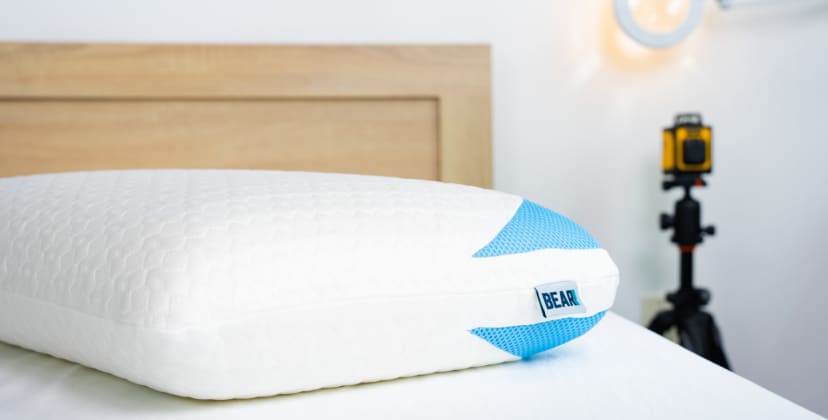

Credit: Sleep Foundation Test Lab
Price Range
$125 – $145
Fill
Aerated LOFT-X polyfoam
Firmness
Medium
Full Details
Proper neck support is crucial if you’re trying to stop snoring — if your head hangs back too far on your pillow, this can compress your airway and increase the likelihood of snore-triggering vibrations in your throat. The Bear Pillow contains a single piece of LOFT-X, a proprietary polyfoam material that provides plush cushioning but won’t compress too deeply. This helps ensure your head is propped up high enough to reduce snoring.
The foam is ventilated with small holes to promote airflow throughout the interior. This allows the pillow to maintain a comfy core temperature. Another cooling component is the cover, which is woven with heat-dissipating Celliant fibers and equipped with mesh corner panels for extra breathability. You cannot remove or machine-wash the cover, so you’ll need to spot clean the fabric if stains or smudges occur.
Standard and king sizes are available with profiles of 5.5 and 5 inches, respectively. These are considered mid- to high-loft designs, and are best suited to side and back sleepers. Some of the stomach sleepers on our testing team also enjoyed the pillow, while others found it too thick and felt some neck strain. One quality we noticed during our tests was excellent shape retention — since the core consists of solid foam, you’ll never need to fluff the pillow.
Approachable pricing and free shipping within the contiguous U.S. make the Bear Pillow a solid choice for budget-conscious shoppers. Keep in mind this is a final-sale item and you won’t be able to return it for a refund after the original purchase date. You will, however, receive a two-year warranty against manufacturing defects.
Best for Spinal Alignment
Snore Less Now Posiform Anti-Snore Pillow
8.2 /10
Test Lab Score
The Snore Less Now Posiform Anti-Snore Pillow is designed to provide ergonomic support and even spinal alignment for side sleepers. Solid memory foam retains its full shape over time, while the cover is made of bamboo-derived fabric to ensure consistent cooling and temperature control.

Price
$120
Fill
Solid memory foam
Firmness
Medium
Full Details
Many people who snore find relief by sleeping on their side, but this can be a challenging transition if you’re accustomed to back or stomach sleeping. The Posiform Anti-Snore Pillow from Snore Less Now promotes comfy side sleeping with a cradle for your head and neck and a small indentation for your downward-facing shoulder.
A central ridge allows you to sleep on either side without rolling onto your back during the night, and the pillow tilts slightly down to keep your airway open while you sleep. This design also promotes healthy alignment by keeping your head, neck, and shoulders in line with the rest of your spine.
Since the core contains solid memory foam, you’ll never need to fluff the pillow — it’ll retain a full shape over time. At the same time, the pillow isn’t too heavy or awkward to adjust. An outer cover made of rayon derived from bamboo helps reduce heat retention and wicks away moisture from your skin. The pillow’s core is encased in a second cotton cover. Both covers can be removed and machine-washed to keep the pillow hygienic. One standard size is available.
The Posiform Anti-Snore Pillow is competitively priced and ground shipping is free for all orders. Returns are allowed within 120 days of the delivery date.
Best Pressure Relief
Sweet Zzz Plant-Based Pillow
8.4 /10
Test Lab Score
Use code SF10 for 10% off sitewide
Use code SF10 for 10% off sitewide
Sweet Zzz’s Plant-Based Pillow is packed with plush, cloud-like down alternative fibers derived from botanical matter. Two lofts are available to ensure you get the elevation you need to decrease snoring without the heat retention or allergy potential of real down.
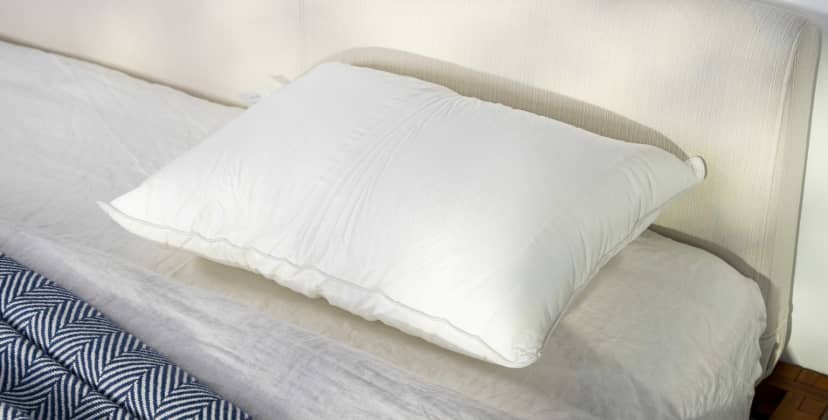
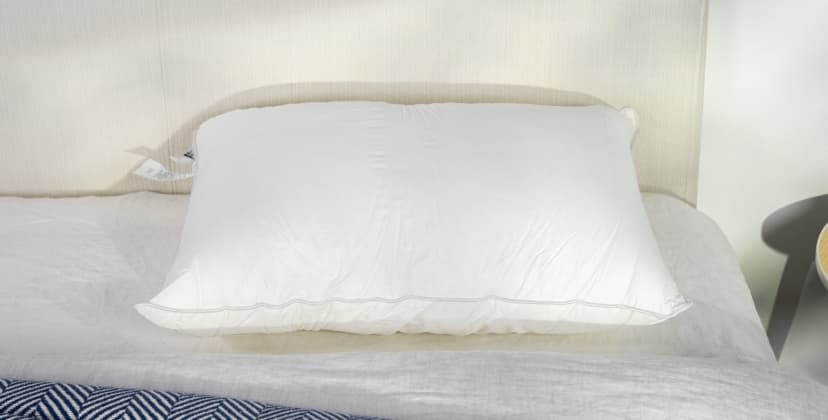
Credit: Sleep Foundation Test Lab
Price Range
$135 – $150
Fill
Plant-based down alternative fibers
Firmness
Medium
Full Details
The Sweet Zzz Plant-Based Pillow is a down alternative pillow with enough loft to keep your head supported while still comfortably cradling your head. Available in two lofts, the pillow ensures your head, neck, and spine are properly aligned.
The pillow is composed of a vegan down alternative fill derived from plant material, which should appeal to shoppers who enjoy the feel of down but prefer materials that are not sourced from animals or made of synthetic fibers. An inner chamber contains dense fill that creates a supportive core, while an outer chamber is composed of a plusher fill that compresses for moderate pressure relief. The cover is made of 100% cotton. You may machine wash the pillow on a gentle cycle and tumble dry on a low heat setting.
Shoppers may choose between a low or high profile. The thicker model has a 7-inch loft and is best suited for side sleepers, who benefit from pillows that fill the space between the neck and bed surface. Back sleepers will likely prefer the 5-inch model, since it supports the head without elevating it too high.
Sweet Zzz offers a 50-night sleep trial to try out the pillow at home. Shipping is free to addresses in the contiguous U.S. The pillow is backed by a one-year warranty.
Best Adjustable Loft
Layla Kapok Pillow
9.3 /10
Test Lab Score
Use this link for the most current discount.
Use this link for the most current discount.
The Layla Kapok Pillow contains a blend of shredded memory foam and down-like fibers from the kapok tree, resulting in a balance of contouring and plushness. You can add or remove the fill as needed to create the right loft for your preferred sleep position.
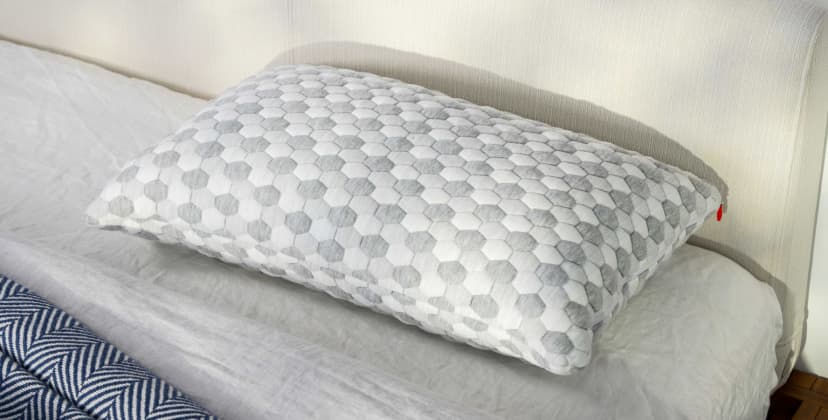


Credit: Sleep Foundation Test Lab
Price Range
$109 – $129
Fill
Shredded memory foam and kapok tree fiber blend
Firmness
Medium Soft
Full Details
Finding a comfortable position that reduces snoring often requires determining the optimal pillow loft for you. The Layla Kapok Pillow makes that a little easier by allowing owners to customize the loft to fit their needs and preferences.
The pillow arrives overstuffed with a fill of plush memory foam and kapok tree fiber. If it is too thick for you, simply unzip the cover and remove some of the fill for a thinner pillow. Owners can continue to experiment with the loft level until they find the right balance for their snoring. The material is also highly moldable, so sleepers can also bunch and manipulate the pillow as needed.
A soft polyester and viscose blend cover with CuTEC fibers encases the fill. CuTEC is a proprietary copper fiber technology designed to wick away heat and limit odors.
While the pillow generally has a medium soft feel, it may seem plusher if you remove some of the fill. At full loft, snorers who sleep on their backs and sides are likely to get the right level of support. Stomach sleepers will likely need to remove much of the fill to prevent their heads from being pushed too far backward and potentially putting more pressure on their airways.
This pillow is a standard rectangular shape and comes in queen and king sizes. A 120-night money-back guarantee lets you return the pillow for a refund after you’ve tried it for at least two weeks. Defects like faulty seams and flattening of the fill are covered by a 5-year warranty.
Best Overall
Saatva Latex Pillow
9.6 /10
Test Lab Score
Use this link for the most current discount.
Shop at SaatvaA plush, lofty pillow packed with shredded latex that delivers gentle cushioning for the head and neck.
See More Details

Credit: Sleep Foundation Test Lab
Best Value
Brooklyn Bedding Talalay Latex Pillow
9.0 /10
Test Lab Score
25% off sitewide
Shop at Brooklyn BeddingA solid latex core gives this pillow impressive loft, above-average cooling, and excellent shape retention.
See More Details

Credit: Sleep Foundation Test Lab
Best for Side Sleepers
Eli & Elm Cotton Side-Sleeper Pillow
8.9 /10
Test Lab Score
20% off
Shop at Eli & ElmAn adjustable pillow with an ergonomic shape specifically designed with side sleepers in mind.
See More Details

Credit: Sleep Foundation Test Lab
Most Comfortable
Silk & Snow Pillow
9.0 /10
Test Lab Score
Use this link for the most current discount.
Shop at Silk & SnowA comfy adjustable pillow that allows you to add or remove fill for optimal firmness and loft.
See More Details

Credit: Sleep Foundation Test Lab
Best Wedge Pillow
Helix Wedge Pillow
8.6 /10
Test Lab Score
Use this link for the most current Helix discounts
Shop at HelixA wedge pillow formed from high-density memory foam that elevates your head and neck without sinking.
See More Details

Best for Back Pain
DaVinci Orthopedic Pillow
7.8 /10
Test Lab Score
A sophisticated, adjustable pillow system that can elevate your head and neck up to 45 degrees.
See More Details

Best Neck Support
Bear Pillow
8.5 /10
Test Lab Score
40% off with code: SF40
Shop at BearA pillow cushioned with solid foam that cushions sore spots in your head and neck while keeping these areas elevated.
See More Details

Credit: Sleep Foundation Test Lab
Best for Spinal Alignment
Snore Less Now Posiform Anti-Snore Pillow
8.2 /10
Test Lab Score
An effective anti-snoring pillow with a cushy memory foam core and an ergonomic shape geared toward side sleepers.
See More Details

Best Pressure Relief
Sweet Zzz Plant-Based Pillow
8.4 /10
Test Lab Score
Use code SF10 for 10% off sitewide
Shop at Sweet ZzzA plush pillow with cushy, plant-based down alternative fill that provides deep cushioning and doesn’t retain much heat.
See More Details

Credit: Sleep Foundation Test Lab
Best Adjustable Loft
Layla Kapok Pillow
9.3 /10
Test Lab Score
Use this link for the most current discount.
Shop at LaylaA cushy blend of shredded foam and natural kapok fibers gives this pillow a plush, adaptive feel.
See More Details

Credit: Sleep Foundation Test Lab
What Causes Snoring?
There are several possible causes of snoring. While the root cause is a vibration of the tissues in the airway, this can be triggered by muscle relaxation, allergies, and certain physical ailments, like a deviated septum, nasal polyps, and/or enlarged tonsils and adenoids. If a condition causes inflammation or narrowing of the airway, it could also lead to snoring.
Age and weight are also often linked to snoring. As an individual gets older, the throat muscles may relax more overnight, leading to sonorous vibrations. Carrying extra weight could also be linked to less muscle tone and more tissue around the neck, which may increase the likelihood of snoring.
Other, more controllable aspects could also contribute to snoring. Many people snore more when sleeping on their backs, because gravity may make the throat more likely to narrow. Alcohol acts as a muscle relaxant, so consuming it may cause the airway to relax and contribute to more snoring. Additionally, smoking could irritate the airway and trigger inflammation that could cause the throat to vibrate.
How to Choose a Pillow for Snoring
Selecting a pillow for snoring requires all the normal considerations involved in finding the right pillow and some factors unique to the condition. Assessing your needs and preferences will help inform your decision.
Sleeping position, loft, support, firmness, and other factors are some of the top things to look for when purchasing a pillow for snoring. Not only do these factors affect comfort, but they can also influence the likelihood of soft tissues vibrating during the night.
Many companies that produce pillows for snoring try to present their models as ideal for all sleepers and positions. While these options may accommodate most individuals, they won’t be optimal for everyone since personal needs and preferences vary. Weighing the unique factors that affect your sleep with specific aspects of the pillow design can help you find the best snoring pillow for you.
Sleeping Position
Sleeping position can affect comfort, alignment, and snoring. Most sleepers should aim for a pillow that keeps the neck aligned, as allowing the head to slump or forcing it upward could lead to more pressure on the airway and trigger snoring. Because of the force gravity has on the soft tissues in the airway, snoring is especially common for back sleepers, so some who favor this position prefer to use a wedge pillow for additional elevation.
Loft
The right pillow loft (height) is critical to healthy spinal alignment, and it can also help with snoring. A model that’s too thick might push the head up, while one that’s too thin could allow the head to droop, either of which could contribute to airway constriction and increased snoring.
The ideal loft depends primarily on body type and sleep position. Sleepers with broader shoulders and/or heavier heads usually need a thicker pillow to fill the space between their mattress and head and neck while providing adequate support, and those with narrower shoulders and/or smaller heads often need a thinner model for support without excessive lift.
Support
Support is essential to maintaining proper spinal alignment, and it can also play a role in snoring prevention. If the pillow goes flat under the weight of a back or side sleeper’s head, the neck may bend and cause the airway to constrict. Similarly, if the pillow is too supportive, it may force the neck to bend in the other direction, also potentially putting pressure on the soft tissues.
Finding the right level of support is often a matter of trial and error, as it can depend on the weight of your head, your sleep position, your shoulder depth, and other factors.
Firmness Level
The firmness level affects the pillow’s support and comfort. A firm pillow may be ideal for individuals who weigh more and need the extra support to keep their necks aligned, while a softer option may be better for smaller sleepers who need extra plushness to sink in.
You should also consider sleep position and pillow loft when assessing firmness. Side and back sleepers usually need firmer options than stomach sleepers. However, depending on the fill, an especially thick pillow may not need to be as firm to feel supportive.
Pressure Relief
While pressure relief does not significantly affect snoring, it can have a major impact on comfort. A pillow that molds to the head and neck to redistribute their weight can help prevent pressure from accumulating around any one area, which may limit aches and pains and “hot spots” from pressure buildup.
Shape
Various pillow shapes may be used as anti-snoring pillows depending on sleep position and personal preferences. Some sleepers prefer standard rectangular bed pillows, while others may benefit from a wedge-style pillow or contoured design.
Wedge pillows elevate the entire upper body rather than just the head and neck, which is intended to reduce the likelihood of gravity forcing the soft tissues of the airway to compress. Ergonomic, contoured pillows are designed to support spinal alignment, and this could also limit snoring for some individuals.
Price
As with any pillow, the prices of snoring pillows vary a great deal. Budget-friendly options start at under $40, while high-end and technologically advanced options can top $150. When considering the price point, you should also weigh the overall value. More durable options may not need to be replaced as frequently, so they may be worth it over time even if they require a higher initial investment.
Quality Materials
Pillow materials influence comfort, performance, durability, and support, so selecting a model constructed of quality materials can make a big difference in the sleep experience. Those made of lower-quality components often cost less, but it may be worth spending extra for a high-quality anti-snore pillow if it’s likely to be more effective, feel more comfortable, and/or last longer. Since allergic reactions can contribute to snoring, allergy sufferers may also want to weigh the ease of care and allergy potential of any materials in the pillow.
Moldability
Moldability refers to how easy it is to manipulate the shape of the pillow. Some snorers may prefer to bunch up their pillow to fit comfortably under their head and neck and accommodate any sleep position they choose. However, this may also require more effort during the night to find the right shape to keep the spine aligned and limit airway compression.
Temperature Regulation
While little research examines the effects of temperature on snoring, many experts believe sleeping in a cooler room is beneficial. Similarly, finding a pillow that regulates temperatures well can reduce the likelihood of the sleeper overheating and trying to reposition to find the cool side of the pillow.
Breathable models usually provide strong temperature control by allowing heat to escape. Some advanced components, like phase change material and gel-infused foam, also purport cooling effects.
What Pillow Styles Are Best for Snoring?
The best pillow style for snoring will depend on your sleep position and personal preferences, but wedge pillows, ergonomic models, adjustable options, and memory foam varieties often top the list.
Wedge
Wedge pillows get their name from their distinctive wedge-like shape. These models are typically constructed of foam and designed to elevate the upper body, which is thought to limit soft tissue compression that leads to snoring and relieve sinus pressure by allowing drainage.
Adjustable
Adjustable options allow users to modify the loft and/or firmness of their pillow based on their personal needs and preferences. These models may be beneficial for snorers, as they provide the opportunity to experiment with different feels to see what works best. Additionally, if symptoms change over time, the owner can adjust their pillow accordingly.
Memory Foam
Solid memory foam pillows respond to the sleeper’s heat and weight to mold to their head and neck. This may help sleepers maintain the natural banana-like curvature of the neck, which could in turn reduce the likelihood of poor posture contributing to throat vibrations.
Shredded memory foam pillows are also available. These options tend to be more moldable than solid memory foam, but they’re less likely to retain their shape for consistent support throughout the night.
Polyfoam
Like memory foam pillows, polyfoam models may contain either shredded or solid material. The shredded options typically perform better in moldability and the solid options generally earn higher marks for shape retention.
Since polyfoam tends to be more breathable than memory foam, it may be a good option for snorers concerned about overheating. However, lower-quality polyfoam options may be more prone to developing lasting indentations that limit the pillow’s ability to keep the spine aligned.
Latex
A latex pillow may use either shredded or solid latex foam. Since latex tends to be relatively dense, either option should be durable and supportive, though shredded models will likely be more moldable. Natural latex is resistant to dust mites, a frequent allergy trigger, so pillows made of the material may be ideal for those who snore due to their allergy symptoms.
Feather
Feather pillows are often both moldable and supportive, which may make it easier for snorers to find a comfortable position that limits snoring. However, some feather pillows can trigger allergy symptoms, so they might not be ideal if you suspect allergies are contributing to your snoring.
Down
Down is a softer, lighter type of feather that has a plush feel and exceptional moldability. Like feathers, however, down models could trigger allergy symptoms for some individuals, potentially aggravating snoring.
Other Tips for Reducing Snoring
Pillow choice can be one of the easiest and most affordable ways to reduce the severity of snoring, but there are other options. The following tips may be used in addition to selecting the right pillow for you.
- Ask your doctor about sleep apnea: Sleep apnea is a medical condition that causes abnormal breathing during sleep, and snoring is a common sign of the disorder. A sleeper may temporarily stop breathing, which can lower the body’s oxygen supply and lead to less restful slumber. This condition can have serious health impacts, so it’s important to talk to your doctor to determine whether you suffer from sleep apnea and what should be done to protect your health.
- Use an anti-snoring mouthpiece: Anti-snoring mouthpieces are designed to reduce snoring by either holding the lower jaw or tongue forward to prevent them from falling back and putting pressure on the airway. Most of these devices are sold over the counter, but you may want to consult with your doctor to see if they’re a good option for you.
- Sleep on your side: If you’re a back sleeper, repositioning to your side may help limit snoring. This position makes the tongue and lower jaw less likely to fall toward the back and press on the airway, so many individuals snore less when sleeping on their sides than on their backs. If you struggle to stay on your side, a body pillow positioned behind you might help prevent you from inadvertently returning to back sleeping.
- Limit alcohol and tobacco consumption: Alcohol can relax the muscles, while tobacco can cause throat irritation, both of which could lead to vibrations in the airway. Limiting or eliminating your use of alcohol and/or tobacco may help reduce snoring.
- Use an adjustable bed: Lifting the upper body can often relieve snoring by reducing pressure on the airway. While this can be done with the right pillow, an adjustable bed is another great option that allows you to experiment with what position works best for you.
How We Test: Rigor, Data, and Sleeper Feedback
We understand choosing the right pillow is crucial to a good night’s rest – especially if you snore. Our expert team has evaluated hundreds of pillows in our Seattle-based Test Lab, and some of the criteria we test for helps us determine whether a pillow will help you cut down on snoring. Loft, firmness, support, and shape retention are some of the most important considerations. We also test pillows for temperature control, ease of care, and cost. Check out the full pillow testing methodology for more information, but below you’ll find a summary of our pillow testing process.
Construction analysis: Our team carefully analyzes each pillow, making note of physical characteristics such as loft, firmness, and material construction. This helps us gauge expected lifespan, ease of care, and overall quality.
Product testing: Members of our testing team take turns lying on each pillow in different sleep positions to determine if it’s best suited to side, back, or stomach sleeping. These hands-on tests also help us rate the pillow for temperature control, shape retention, and moldability.
Field testing: Once we’re finished with the pillow in our Test Lab, one of us takes it home and sleeps with it on their own bed for several weeks. Daily notes and a full report on their experience with the pillow help us judge how well the pillow holds up in the long run.
User testing: For each pillow we test, we use data from customer surveys and product reviews to ensure our initial ratings reflect real-world sleeper experiences.
More Pillow Guides
For more information about different types of pillows, check out the following pages:

Still have questions? Ask our community!
Join our Sleep Care Community — a trusted hub of product specialists, sleep health professionals, and people just like you. Whether you’re searching for the perfect mattress or need expert sleep advice, we’ve got you covered. Get personalized guidance from the experts who know sleep best.


